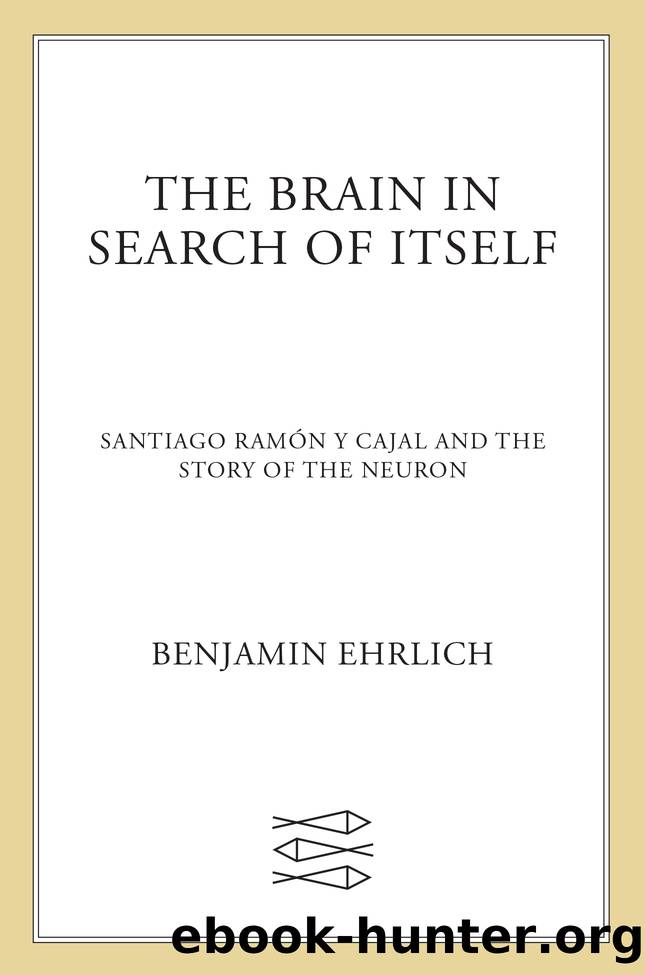The Brain in Search of Itself: Santiago Ramón y Cajal and the Story of the Neuron by Benjamin Ehrlich

Author:Benjamin Ehrlich
Language: eng
Format: epub
Publisher: Farrar, Straus and Giroux
âFor the histologist,â Cajal declared, âevery progress in staining technique comes to be something like the acquisition of a new sense open to the unknown.â
* * *
As a consequence of Cajalâs Moscow Prize victory, the 1903 International Congress of Medicine was held in Madrid, and thousands of doctors descended on the Spanish capital. In the lobby of the Institute for Biological Research, Cajal set up microscopes to show the attendees his findings, just as he had fourteen years earlier in Berlin. He and Simarro displayed sections of brain tissue as scientists roamed the hall, chatting and sipping beer. Cajal was determined to prove, beyond any doubt, that his views on neurofibrils were âabsolutely objective.â His speech at the conference was a polemic against Bethe, whose views amounted to âpanreticularism, a kind of ocean where nervous currents pour out and all channels become confused.â If Betheâs theory is true, Cajal said, then histologists should hang a sign above their laboratories with the inscription from the entrance to Hell in Danteâs Inferno: Lasciate ogni speranzaââAbandon all hope.â
Also at the congress was the Russian physiologist Ivan Pavlov, director of the Imperial Institute of Experimental Medicine in Saint Petersburg, where he was conducting experiments on gastric function in dogs. In the vote for the 1900 Moscow Prize, Pavlov finished second to Cajal, earning six votes to Cajalâs fourteen. Pavlov spoke after Cajal, reading from a paper titled âExperimental Method as a New and Extremely Fruitful Method of Physiological Research,â written in perfect German, which he pronounced with difficulty. For the first time in public, Pavlov discussed the effects of conditioned reflexes on the psyche. âEssentially one thing in life is of real interest to usâour psychical experience,â Pavlov declared. His goal was to âexplain the mechanism and vital meaning of that which most occupies manâ our consciousness and its torments.â Pavlov and Cajal asked the same questions, one by way of psychology and the other anatomy. âNow we must learn Russian,â one attendee of the congress said, âjust as we have been obliged to learn Spanish in order to follow Ramón y Cajalâs papers in Madrid.â Four years later, Pavlov won the Nobel Prize for the work that he first presented in Madrid.
Download
This site does not store any files on its server. We only index and link to content provided by other sites. Please contact the content providers to delete copyright contents if any and email us, we'll remove relevant links or contents immediately.
Hit Refresh by Satya Nadella(9136)
When Breath Becomes Air by Paul Kalanithi(8447)
The Girl Without a Voice by Casey Watson(7889)
A Court of Wings and Ruin by Sarah J. Maas(7847)
Do No Harm Stories of Life, Death and Brain Surgery by Henry Marsh(6941)
Shoe Dog by Phil Knight(5269)
The Rules Do Not Apply by Ariel Levy(4969)
A Higher Loyalty: Truth, Lies, and Leadership by James Comey(4964)
Hunger by Roxane Gay(4928)
Tuesdays with Morrie by Mitch Albom(4784)
Everything Happens for a Reason by Kate Bowler(4743)
The Immortal Life of Henrietta Lacks by Rebecca Skloot(4588)
Millionaire: The Philanderer, Gambler, and Duelist Who Invented Modern Finance by Janet Gleeson(4478)
How to Change Your Mind by Michael Pollan(4357)
All Creatures Great and Small by James Herriot(4322)
The Money Culture by Michael Lewis(4207)
Man and His Symbols by Carl Gustav Jung(4137)
Elon Musk by Ashlee Vance(4128)
Tokyo Vice: An American Reporter on the Police Beat in Japan by Jake Adelstein(3996)
